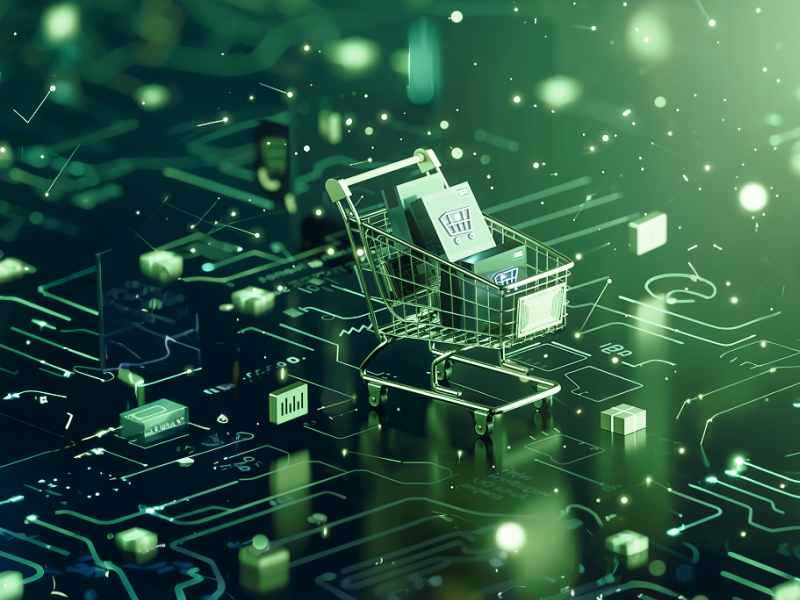1. Chatbots and virtual assistants improve customer service
Artificial Intelligence-driven chatbots and virtual assistants have transformed how businesses interact with customers. Offering support around the clock without human intervention, these AI tools respond to inquiries, solve problems quickly, and provide personalized shopping recommendations.
According to a report by Gartner, it predicts that by 2022, 70% of customer interactions will involve emerging technologies such as chatbots, machine learning, and mobile messaging.
These advancements in AI technology highlight the growing impact on customer service efficiency, enabling businesses to handle customer interactions more effectively and improving user satisfaction.
2. Optimized inventory management
With predictive analytics, Artificial Intelligence aids eCommerce businesses in accurately forecasting demand, automating the restocking process, and maintaining ideal inventory levels.
A DHL study highlighted that AI-enhanced inventory management could slash stock-outs by as much as 75%, which in turn could elevate sales by 10-40%.
A McKinsey report also pointed out that leveraging AI for inventory management could cut forecasting errors by half, potentially reducing inventory costs by 20-50%. This efficiency in managing stock mitigates the risks associated with surplus or insufficient inventory and supports dynamic pricing strategies so that businesses can adjust to market demands swiftly and roll out products more efficiently.
3. AI-powered fraud detection
Through the analysis of data points such as transaction history and user behavior, AI systems adeptly identify patterns indicative of fraud.
Securing transactions against fraudulent activities is a top priority for eCommerce businesses. The deployment of AI in detecting anomalies has proven effective, with businesses witnessing a notable decrease in chargeback rates.
For instance, the luxury scent shop Snif reported a 30% reduction in chargebacks after integrating AI into their fraud detection processes – showcasing the effectiveness of AI in securing eCommerce transactions against fraud and offering a more secure shopping experience for customers.
4. Innovative visual search capabilities
Artificial Intelligence has introduced visual search technology, transforming how consumers locate and purchase products online. Especially beneficial in industries reliant on visual appeal, such as fashion and home decor, visual search enables customers to use images as search queries.
According to eMarketer, a significant portion of younger consumers, 62% of Millennials and Gen Z, express a preference for visual search capabilities, with 58% using this technology for shopping.
Adopting visual search elevates the shopping experience and indirectly contributes to increased sales by simplifying product discovery, making it more user-friendly and intuitive.
5. AI’s is driving sustainable eCommerce
Accenture’s research highlights that AI-driven supply chain optimizations could cut greenhouse gas emissions by 36% and transportation costs by 39%.
Through optimizing supply chain operations, AI contributes to significant reductions in waste and energy usage. Precise demand forecasting and improved logistics efficiency are among the most appealing benefits, leading to a more sustainable business model.
McKinsey also conducted an analysis that suggests AI-enabled supply chain efficiencies could yield up to an impressive $41 billion in annual savings from carbon emission reductions.
6. Accurate product recommendations
Artificial Intelligence excels in sifting through extensive datasets to deliver precise product suggestions to consumers – assesses variables such as:
- Previous purchases: AI analyzes consumers’ past buying history to identify patterns and preferences, allowing for the recommendation of products that align with their previous choices.
- Browsing patterns: By examining the items and categories a consumer spends time looking at online, AI can deduce their interests and suggest products they are more likely to buy.
- Demographic details: AI considers demographic information like age, location, and gender to make predictions about the types of products a consumer may prefer, ensuring recommendations are relevant to their specific demographic profile.
Segment’s research indicates that 49% of shoppers have engaged in impulse buying triggered by personalized recommendations from brands. Such targeted suggestions boost sales and improve customer satisfaction, as individuals discover products that align with their desires and requirements.
Barilliance found that personalized recommendations can improve conversion rates dramatically, by up to 915%.
7. Cutting-edge supply chain management
Artificial Intelligence can scrutinize data related to inventory levels, delivery timings, and more to pinpoint improvement opportunities. Through process automation and the provision of instantaneous insights, AI helps businesses slash expenses, augment efficiency, and curtail waste.
Research from the Massachusetts Institute of Technology (MIT) Center for Transportation & Logistics indicated that AI-enhanced routing and scheduling solutions can trim delivery times by as much as 30 minutes per stop – streamlining supply chain operations, enhancing logistical performance and sustainability, and cost savings.





